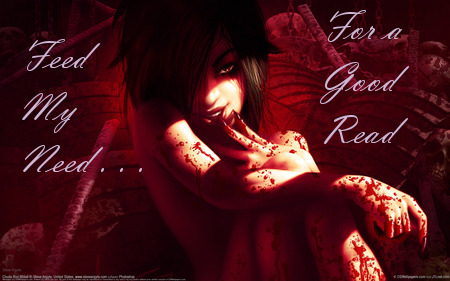Please welcome to Feed My Need, Angelita Williams!
Lessons Learned from my Worst Writing
During college, I minored in creative writing. The courses placed immense pressure on my ego, but it also bred a sense of camaraderie and respect among our tiny group of writers. I think all writers have heard the famous advice from William Faulkner that to write good fiction means having to “kill your darlings,” but when you are a young, eager writer, this advice can be difficult to take to heart.
Looking through my old work, I stumbled upon a short story that I once considered brilliant. My teacher dismissed it completely, and my peers gently prodded me to make revisions. I was appalled that they couldn’t see its genius, and I sulked for the entire semester. My ego was so bruised, I refused to put effort into any other work; and I began editing other people’s work with an insane vigor.
My ego eventually healed, and I avoided alienating everyone with my absurd passion for editing; but I always remembered the short story as captivating and vivid – until I reread it this morning.
It is a period piece, set in industrialist New York City and is my adaptation of the Greek tragedy Madea – which ends with a woman’s ultimate revenge – except in my version, Jason is a mobster and Madea (Madeline) is a deadly assassin and illegal immigrant.
It’s an absolutely bizarre plot, but the Greek version is no less peculiar. There is still a very slim margin of possibility that the story could be good; but what I produced was some hybrid of a bad soap opera and a cheesy mobster movie.
Generic descriptions are ineffective.
His clean-shaven jaw line was strong, and, despite his advancing age, there were no traces of gray in his black hair. His charcoal suit was expensive and well-tailored.
When we talk about art, it is sometimes very difficult to discern between the good and the bad. There is nothing intrinsically valuable in a single word. As writers, we string words together to convey meaning, to paint scene or evoke emotion. Good writing is not only about intention; it is about successfully communicating your intention to a reader.
Obviously, my intentions and my character were not well thought out. The description gives no information about Jason except that he is wearing an expensive suit, has a strong jaw line and has black hair.
The man at the head of the table sat silently as smoke coiled above his head. He did not notice when the cherry of his cigarette fell onto the table, scattering ashes onto the highly polished mahogany. To the average onlooker, Jason Marchetti would have appeared lost in thought; but Lou knew what the tiny wrinkle between Jason’s brows meant. He knew that a deadly focus sat behind those blank green eyes.
I just whipped up the passage, and it’s not brilliant; but the intent is much clearer. I wanted to convey Jason as preoccupied but capable of destructive power. I brought in Jason’s right hand man Lou to give the reader insight into the tone of the scene, and included the description of mahogany to imply wealth.
Passive verbs and repetitive sentence structures are boring.
His clean-shaven jaw line was strong, and, despite his advancing age, there were no traces of gray in his black hair. His charcoal suit was expensive and well-tailored.
The structure of these two sentences is almost identical; and each hinges on a passive verb. The cadence, or rhythm, of the passage reads like a catalog. Essentially, the passage was little more than my way of cataloging Jason’s generalized physical aspects. In a word, it is boring.
Set firm guidelines for your character’s actions.
The faint echo of clicking heels sounded outside the doorway, and the four men fell silent. Jason smoothed his suit jacket and straightened his tie. The doorknob turned, and the men waited.
*Note how the variation of active verbs and varying sentence structure makes the passage more interesting and lyrical.
Why would a fearless mobster smooth his suit jacket and straighten his tie? He wouldn’t. Again, I didn’t have a clear enough concept of Jason as a character.
In the patch of silence that followed the men’s laughter, the echo of clicking heels sounded from the hallway. Lou cleared his throat and straightened his tie before glancing sideways at Jason. The line between his boss’s brow had deepened, but offered no trace of surprise. As the doorknob turned, Jason dropped his cigarette into the crystal ashtray and swept the spilled ashes aside with the side of his hand. He leaned back in his chair, looking straight ahead to the door.
Jason is the leader of violent men, which leaves little room for fear. The passage is meant to show that the mobster carries concern under his nonchalant demeanor. The ashes that he sweeps from the table are meant to display that carelessness requires a clean-up and that he isn’t afraid to get his hands dirty or soil the sleeve of his suit. Lou, obviously, is the less certain of the two, and he looks to Jason for reassurance.
Build mystery by providing clues in each scene.
Hopefully, the looming question is, “Why are these dangerous men so afraid of a woman?”
Only time will tell why the echoes of high heels drive fear into the heart of these ruthless mobsters; and that is what keeps people reading.


Okay, now this is nice work. No need for editing this time. Apparently, it's done just right.
ReplyDelete